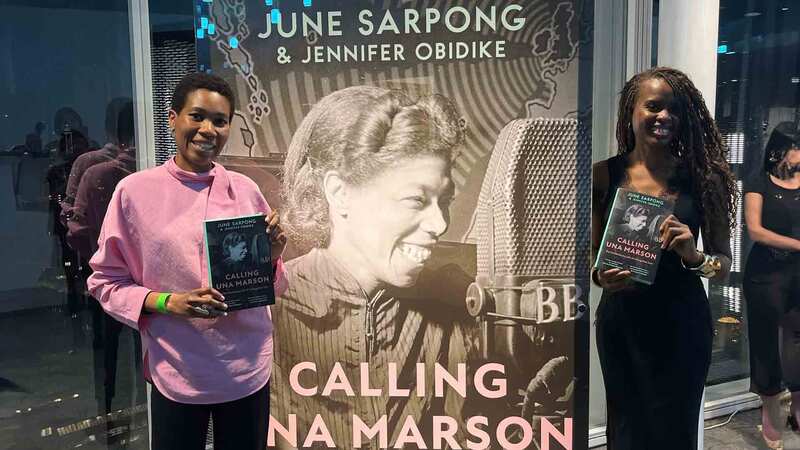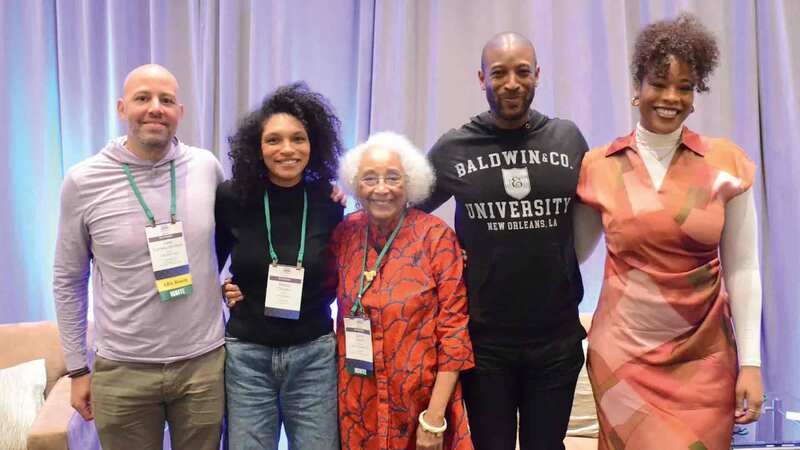You are viewing your 1 free article this month. Login to read more articles.
FutureBook 2024: PRH Audio's Amanda D'Acierno on experimentation with AI in audiobooks
Penguin Random House Audio’s (PRH Audio) global president Amanda D’Acierno told the 2024 FutureBook conference that it would be "almost negligent" if the audiobook publisher was not experimenting with Artificial Intelligence (AI) technologies at this time.
The publisher recently announced that it has been using artificial voices, generated with AI, in a small number of cases to record audiobooks. Speaking with Jon Watt, trade audio and business development director at Bonnier Books UK (BBUK) on Monday 25th November, D’Acierno said that there are "so many uses" for AI technologies, including using artificial narration for audiobooks on the subject of AI.
D’Acierno mentioned the example of Mustafa Suleyman and Michael Bhaskar’s The Coming Wave, which includes an AI-written introduction, and spoke about an author working with PRH Audio on "voice cloning", which would enable him to continue narrating his audiobooks after losing his voice. She said that "the few times" the audiobook publisher has used these technologies have been to narrate characters like robots, including for one book which featured Apple’s "digital assistant" Siri as a character.
D’Acierno said: "It is, of course, natural that those authors are going to want to experiment with AI in their audiobooks."
She also stressed that these technologies can be used to support the work of audiobook publishers and authors, rather than replacing human endeavours.
Where AI narration has been used in an audiobook, D’Acierno explained that this "needs to be really clearly labelled for the consumer". She also said that Audible "does not sell anything that is produced with artificial voice", and that this is "keeping the marketplace sort of in one spot".
Speaking about Orion, the AI tool that PRH Audio has created for editing and post-production work, the global president of audio said that this helps cut down on the time that people would spend ensuring that "everything syncs up". This tool can be particularly helpful when working with authors or actors who have limited time to record an audiobook.
D’Acierno spoke about the team’s experience recording the audiobooks of the former US president Barack Obama and former First Lady Michelle Obama. D’Acierno said that Orion enabled the producer and director recording Michelle’s audiobook to cut down on the time spent manually syncing up passages, whereas the tool had not been ready when the former president was recording his audiobook.
D’Acierno said: "When you’re talking about people that have a huge global presence and who are travelling often, whether that’s the Obamas or a celebrity, you don’t have a lot of time with them and that recording – to give up a week of their time to go into the studio – is a huge gift. To get them back into a studio to do those pick-ups is often impossible, so this is a really good way for us to use AI technology to make sure we have a perfect recording using their voices."
Watt asked D’Acierno whether there are "any lines you’re not going to cross", to which she responded: "I don’t know [if there are] super red lines that we wouldn’t cross. I will say that we would put a tremendous amount of thought behind everything we do, and it’s not a decision that would be made without working with an author, an author’s representative, working with the consumer in mind, working with our sales platforms in mind, and what’s going to work for their customers. So, it’s nothing that would ever be done in a vacuum, first and foremost, without the author’s consent and support."
The conversation was followed by further sessions on audio, held throughout the day, including a presentation by Watt on international guidelines for identifying types of AI narration in audiobooks.
A panel featuring Spiracle Audiobooks founder Kate Bland, writer and designer Tom Abba and Pan Macmillan audio strategy manager Becca Souster, moderated by Bookwire’s global head of audio Videl Bar-Kar, also looked at the future of audiobooks and where the format could go next.





















